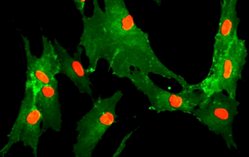Transplant and Viral Immunity

Overview
Our aim is to find ways to engage the body’s immune system in fighting cancer, particularly cancers of the blood system. Linked to this research, we are also examining the response to infections that are commonly associated with cancer treatment, such as cytomegalovirus, as well as the development of immune responses during pregnancy.
Our Research Group
The focus of our work is in translating fundamental immunological research to improve understanding and treatment of human disease. As a result of this, the current projects in the group range from fundamental immunological research through to first-in-man clinical trials. We are especially interested in the role of lymphocytes in health and disease: in particular in the role of these cells in cancer, cytomegalovirus (CMV) infection and in pregnancy.
Leukaemia and solid tumour research
Allogeneic haematopoietic stem cell transplantation (HSCT) is the recognised treatment for many malignant haematological disorders. This treatment has two major benefits: firstly, the patient gains a new healthy immune system and, secondly, donor lymphocytes can kill any residual malignant patient cells in a process called Graft versus Leukaemia (GVL). However, whilst donor lymphocytes can kill malignant  patient tissue, they can also kill healthy tissues, generating Graft versus Host Disease (GvHD). We are examining the roles of T-cells, NK cells and B-cells in the GVL and GVH responses and using our findings to translate this work into therapies that promote GVL whilst minimising GvHD. As an extension of this work, we are also examining lymphocyte responses in solid tumours, for example in testicular cancer as well as the influence of the tumour microenvironment on lymphocyte function in diseases such as multiple myeloma.
patient tissue, they can also kill healthy tissues, generating Graft versus Host Disease (GvHD). We are examining the roles of T-cells, NK cells and B-cells in the GVL and GVH responses and using our findings to translate this work into therapies that promote GVL whilst minimising GvHD. As an extension of this work, we are also examining lymphocyte responses in solid tumours, for example in testicular cancer as well as the influence of the tumour microenvironment on lymphocyte function in diseases such as multiple myeloma.
Cytomegalovirus research
In addition to GvHD, another major complication of stem cell transplantation is a dramatically increased susceptibility to infection, particularly CMV. This is a major cause of morbidity and mortality in transplant patients and, as such, has a significant impact on the success rate of HSCT. Our recent work centres on developing a better understanding of the role of CMV in transplant outcome and in developing therapies to treat CMV infection after transplant. As a natural extension of this work, we are also examining the effect of CMV infection on immunity in healthy individuals. Our work has demonstrated that CMV places a significant burden on the immune system as people age. Hence, a large part of our current studies is based around understanding the magnitude and implications of this burden throughout life.
Immune responses in pregnancy
Within the group, we have a strong interest in the development of immune responses during pregnancy. T lymphocyte responses specific for the fetus have been demonstrated in many women after pregnancy. This is clinically important in the generation of GVL and GVH responses, where previously pregnant females act as stem cell donors and it may also be potentially important in the pathogenesis of fetal loss. Our current work is investigating the role and the modulation of these responses in miscarriage and in stem cell transplantation.
Leukaemia and solid tumour research projects
- The influence of early immune reconstitution on stem cell transplant outcome
- The role of chemokine receptor-ligand interactions in the generation of graft versus host disease
- Natural Killer cell responses in GVL and GvHD after transplantation
- Utilising cancer testis antigen responses to treat solid tumours
- Study of male-specific immune responses in female donors and its correlation with the clinical outcomes of stem cell transplantation
- The isolation of human monoclonal antibodies with specificity for novel therapeutically-relevant leucocyte determinants
- The influence of the bone marrow stromal microenvironment on disease in multiple myeloma
- Immune reconstitution after donor leukocyte infusion treatment for leukaemia relapse
CMV research projects
- Characterisation and cloning of the CD4 T cell response in CMV infection
- The influence of CMV infection in an ageing population
- Vitamin D and CMV infection
- Interactions between CMV and gamma delta T cells in leukaemia
- CMV in chronic lymphocytic leukaemia
- Projects based on the immune response during pregnancy
- The immunological consequences of progesterone in recurrent miscarriage
- Villitis of unknown aetiology: a potential process of fetal allograft rejection
Other projects
- The clinical and functional significance of loss of duffy antigen/receptor for chemokines (DARC) expression
Current clinical trials
- ASPIRE: a trial aimed at enhancing immunity to influenza in elderly individuals through reversal of immune senescence by herpes virus infection
- HA1: a phase I trial of a DNA/MVA vaccination strategy for promotion of GvL (minor antigen-specific (HA1)) responses in stem cell transplant donors
- Antiviral therapy can reverse the development of immune senescence in elderly mice with latent cytomegalovirus infection. Beswick M et al. J Virol. 2013 Jan;87(2):779-89.
The genotype of RAET1L (ULBP6), a ligand for human NKG2D (KLRK1), markedly influences the clinical outcome of allogeneic stem cell transplantation. Antoun A et al. Br J Haematol. 2012 Dec;159(5):589-98.- Chemokine-mediated tissue recruitment of CXCR3+ CD4+ T cells plays a major role in the pathogenesis of chronic GVHD. Croudace JE et al. Blood. 2012 Nov 15;120(20):4246-55.
The age-related increase in low-grade systemic inflammation (Inflammaging) is not driven by cytomegalovirus infection. Bartlett DB et al. Aging Cell. 2012 Oct;11(5):912-5.- Fetal-specific CD8+ cytotoxic T cell responses develop during normal human pregnancy and exhibit broad functional capacity. Lissauer D et al. J Immunol. 2012 Jul 15;189(2):1072-80.
Principal Investigators:
Paul Moss
Ram Malladi
Fred Chen
David Lissauer
Postdocs:
Ayman Antoun
Mark Beswick
Joanne Croudace
Suzy Eldershaw
Sarah Essex
Charlotte Inman
Kirsty McGee
Annette Pachino
Aaron Scott